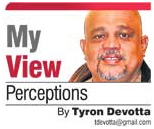IF someone asked me the difference between a journalist and a Public Relations (PR) writer like myself (both using a mainstream platform in dissemination of content they produce) - I could say one is expected to be objective, and that one is not me.
Objectivity is the cornerstone of modern Aday journalism; a significant principle of its Professionalism. Journalistic objectivity in a story refers to fairness, disinterestedness, factuality, and non-partisanship, and most often encompasses all of these qualities.
On the other hand, a PR writer is supposed to be into spin - the one who gives that twist to stories - and have a more subjective approach, sometimes known as advocacy writing.
I was not always a PR writer; for a very good part of my life I was a mainstream journalist. During my time as a mainstream journalist, I often wondered how objective one could get. Meaning, to what extent could I take the disinterestedness and non-partisanship in this very social world that we live in? There were times when I did not use my vote at an election fearing that it would be a partisan act for a journalist (a bit over the top I think, in hindsight). What is this 'objectivity' that journalists need to seek? After years of being on the frontline of the fact and truth business, I realised that it's perhaps the striving and not really the goal that really matters.
From a PR perspective too, I believe that objectivity does have a role to play in the way we deliver information for general consumption; we must understand that however much us PR consultants are expected to see the side of the client who would expect his point of view first, it cannot be at the cost of breaking the norms of the industry i.e. the mass media and journalism. Objectivity to a great extent, has to be a part of any PR strategy, advising a client on do's and don'ts have to be within the parameters of good PR practices, e.g. factuality in the story you tell; if this is broken, then one is only cutting the ground from under.
This does not mean one cannot present opinion; but then the editor and the reader must be able to clearly distinguish one from the other. What is primarily important to understand is both the journalist and the PR writer are obligated to present information to the consumer which is of value - to be entertained, informed or educated. So what is the spin? For me 'spin' is just a bad word to describe a PR writer's angle to a story. Journalists need to find angles to their stories everyday as much as PR writers need to find angles to position the stories relating to their clients', their services and brands. However, a story done with no factuality to it would certainly be a 'spin' whoever does it -journalist or PR writer alike. Be it PR writer or journalist, it is always good to remember this maxim: "facts are sacred, comment is free".
(Tyron Devotta, PR consultant and head of Media360, was previously a mainstream journalist in print and electronic media. He also edits a new media website.)




